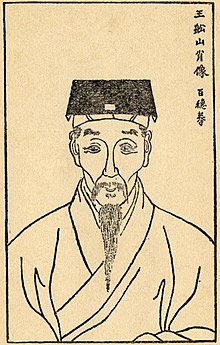Wang Fuzhi
Wang Fuzhi (Chinese: 王夫之) (born October 7, 1619 in Hengyang ; † February 18, 1692 , ibid) was a Chinese philosopher, historian and political analyst. He is counted among the group of Ming loyalists. Based on his criticism of the prevailing Neo-Confucianism , Wang developed a materialist philosophy. His historical-philosophical views led him to demand that a government should serve the good of the people alone. As a Chinese nationalist, he developed the idea of a Chinese ethnic group that defines itself based on biological characteristics and has to differentiate itself from other peoples.
Wang Fuzhi, along with Gu Yanwu and Huang Zongxi, is seen as one of the most influential scholars of the transition period from the Ming to the Qing dynasty . Wang's works served as inspiration for 19th and 20th century Chinese intellectuals. His writings also influenced Mao Zedong and numerous intellectuals in the People's Republic of China .
Life
Wang came from a civil servant family and passed the civil servant exam in 1642. In 1644 the Manchu conquered Beijing and the Manchurian Qing dynasty took over the imperial throne from the Chinese Ming dynasty. Wang rejected this takeover as illegitimate. He joined the armed resistance, but in 1650 he considered it pointless. He then withdrew and led a life as a scholar until the end of his life.
plant
The starting point of Wang's work is the analysis of the cause of the fall of the Ming dynasty, which he regretted. Wang saw a major cause as the distortion of classical Confucianism by the prevailing doctrine of Neo-Confucianism . Generations of neo-Confucian philosophers have distanced themselves further and further from the teachings of Zhang Zai since the Song era and thus tread the wrong path. Wang developed Zhang Zai's teachings further by giving them a practical aspect. According to this, the way ( dao ) is a functional description of matter ( qi ). For Wang there was no meaning or way without matter, as well as non-being .
Like a machine for which there must be an instruction manual, according to Wang there must be laws for a state, even if they are not perfect. However, these laws would have to be adapted to requirements over time. He demanded that political power should serve the good of the people and not the good of those in power.
Wang was a supporter of Chinese nationalism. He did not define this culturally, like some of his contemporaries, but ethnically. He postulated that biological criteria differentiated Chinese from non-Chinese. Wang called for the ethnic Chinese to distance themselves from them and not be ruled by them. With this he was able to justify the rejection of the ruling Manchu , even if they had adopted and promoted Chinese Confucianism.
He wrote numerous works on philosophy, politics and history, none of which were published during his lifetime due to his hostility to the ruling Qing dynasty . Some works were not published until the middle of the 19th century. His best-known works include commentaries on the Book of Changes , on the history book Zizhi Tongjian ("Du tongjian lun") and on the song time ("Song lun") and The Yellow Book ("Huangshu").
Individual evidence
- ^ The Editors of Encyclopaedia Britannica: Wang Fuzhi. In: Encyclopædia Britannica . Retrieved July 7, 2018 .
- ↑ a b c Kai Vogelsang : History of China . 3. Edition. Reclam-Verlag , Stuttgart 2013, ISBN 978-3-15-010933-5 , p. 412-413 .
- ↑ a b c Wolfgang Bauer : History of Chinese Philosophy (= Becksche series ). 2nd Edition. Verlag CH Beck, Munich 2009, ISBN 978-3-406-59301-7 , p. 297-300 .
| personal data | |
|---|---|
| SURNAME | Wang, Fuzhi |
| BRIEF DESCRIPTION | Chinese philosopher, political analyst, and historian |
| DATE OF BIRTH | October 7, 1619 |
| PLACE OF BIRTH | Hengyang |
| DATE OF DEATH | February 18, 1692 |
| Place of death | Hengyang |
